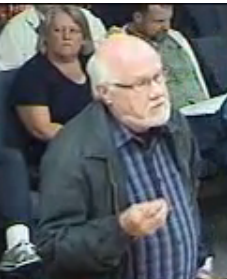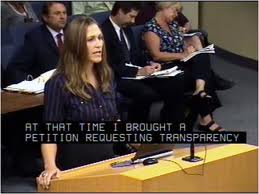 By Pepper Parr
By Pepper Parr
March 3. 2015
BURLINGTON, ON
It is when people can appear before those they have elected and have an open dialogue; an exchange of ideas and concerns that the democratic process works at its best and the way it was supposed to work.
Burlington is not there yet.
Back in 2010 when the Shape Burlington report was published, it was a document put together by former Mayor Walter Mulkewich and the late John Boich. Boich was very close to then Mayor Cam Jackson – he ran his 2010 election campaign.
Jackson created the advisory group to produce a report to take away some of the heat he was getting from disgruntled citizens who were beginning to realize there were real problems with the pier.

Crane working at the pier site topples. Proves to be the point at which problems with the design became evident.
By this time the crane accident had taken place and things were beginning to smell. Law suits were threatened and writs were issued and everyone was off to meet with a judge.
City hall found their collective noses were a little out of joint when the Shape Burlington report was given to Jackson. They felt the report had slammed them, if ever so slightly.
Many people were unhappy with the treatment they were getting from the office of the Clerk.
In the municipal world – the Clerk is a major player. Both the Mayor and the Clerk must together sign each by law that is passed by Council – without the signature of the Clerk – the bylaw isn’t legal.

City Clerk Angela Morgan; has been with the city for more than 25 years. Doesn’t live in Burlington.
Council cannot meet officially without the Clerk being in the room. In closed sessions it is the Clerk who is in place to keep everyone on the straight and narrow. The Gazette has it from more than one source that Burlington’s city Clerk has had to be quite vocal and direct with Council when it is in Closed Session in the past. The Clerk or the chair of the Standing Committee has to read out a statement setting out why a council or a committee is going into a Closed Session and then ensure that the discussion is directly relevant to the reason for going private.
Both city staff and Council members are sworn to secrecy but it is possible to put together a collection of comments to get a sense of how your Council behaves in closed sessions.
In a related article we write about the comments made by the WHO that recently completed an investigation into a complaint from the Burlington Waterfront Committee (BWF) on what did get discussed in a Closed Session on the sale of lake front land between Market and St. Paul Streets south of Lakeshore Road.
BWF people have delegated a number of times on this matter. That group of people is fortunate to have people who delegate very clearly and have their facts well set out. There was an unfortunate occasion when Gary Scobie was delegating on the sale of the Water Street property and Councillor Sharman asked how his Water Street views squared with his views on the Beachway.
Sharman had introduced a totally different subject and put Scobie off his stride. Fortunately for Sharman Scobie was too polite to call Sharman to account for that old political stunt of changing the subject

Monte Dennis delegates frequently – ask him what he thinks of this council and the way it responds to delegations.
Delegating is an art. The way people delegate in Burlington is set out in the procedural bylaw which most people aren’t even aware of. It is the Clerk’s job to ensure that the bylaw is enforced.
It should also be her job to take steps to ensure that the public is fully aware of the bylaw and take some initiative to ensure the public is educated.
Burlington’s Clerk focuses on enforcement.
Recently a long time Burlington resident wrote us about delegating – how it can be done to be effective
“I have had a delegation or two that was not on the agenda” our source said. “You have to ask or tell the Clerk that you want to speak, and what about. Do this with skill and thoughtfulness.”
Our source had delegated multiple times on a matter that he had put on the agenda. The individual reminded us that ”you were there, and eventually came to my house for a chat about it”.
“I was very insistent about my right to speak”, said the source “although you may have to wait for a meeting date if the next Committee meeting has a full agenda already. The web site directions for delegations allows for this, it’s just more trouble. You just have to push.

Gary Scobie has delegated frequently; is always well prepared – but can seldom get this council to agree with some of the exceptionally good points he makes
“I was told by an ex-mayor that they can’t just stop you, but it’s not straightforward as when you are speaking to an agenda item.
“It also helps to be imaginative about how what you want to say might fit into an existing agenda. For example, the just completed budget process provided an opportunity to position the issue as a budget accountability, business case matter, where the delegate would ask about how this expenditure would fit in.
“The Strategic Planning process might provide another item – the question being how does this property deal fit into the city strategic thinking, and what kind of business case was proposed.
“Imagination and tact, with rational evidence based arguments are needed. It takes time and planning.”
Indeed it does – but it can be done – and when done effectively changes can be made.

Councillor Marianne Meed Ward used delegations to propel her way into public office. She is one of the few that probes and asks questions of the delegators.
It is interesting to note that in Committee of the whole meetings, which are not broadcast, the dialogue between staff and council is very open and very healthy. There is mutual respect most of the time – not always.
That same level of respect isn’t nearly as evident when voters, taxpayers, the people to whom elected officials are accountable to – the same people who consistently say it is an honour and a privilege to serve the public.
Evidence of that honour and privilege is not evident at city hall much of the time.
Our source wrote the Gazette to comment on some of the comments that were appearing.
“I went back and looked at the story again’, he said “and saw that I had commented twice, both suggesting action on the part of the commenters.
“My take in both cases, and similar ones, is that the commenters don’t seem willing to call the mayor or Councillor, or whoever, to account for the issue raised. You have to go to city hall, as a delegation, and demand an explanation. That’s the only way to seek accountability. You have to call them out.”
“The commenters either can’t be bothered, are too lazy, or have no case. Or they like the system the way it is in case they get in power and can act the same unaccountable way.”
















Mr. Muir:
Apologies but I realize that in my previous response I didn’t provide the primary reason for my initial comment. Less haste, more speed I suppose. My primary issue with the delegation process, as it is currently practiced at City Hall, is that it provides no opportunity to challenge Council directly, to ask specific questions to which they are mandated to respond. As the delegation process currently exists, only Council gets to ask questions and I have seen it practiced in a very one-sided, almost abusive way. I believe in the dynamic of active discourse and respectful confrontation and, in my opinion, the current delegation process does not provide it. Perhaps regular “Town Halls” should become part of the City’s public engagement framework.
I have to agree with Helen. Given the fact that you can’t ask Council any questions and that the protocols around the delegation process, most carefully controlled by the Clerk, make a Rubik’s cube look simple, it’s difficult to see how delegations “hold council accountable” in any way. On the surface it’s ‘democracy in action’ but that’s only the appearance. In what forum and under what process do citizens have the opportunity to actually challenge Council? I don’t believe that there is any currently. As practiced today at City Hall delegations are a “dumb show” that provide the semblance of “popular input” but have absolutely no force or significance – particularly with this group.
Hard to disagree that the present delegation process isn’t much of an accountability mechanism, but nobody ever said it was easy. What you seem to suggest is giving up. Apathy is how we got to where we are.
The point is that you can delegate and say whatever you want, and demand answers in the Council chambers. You can raise an issue and target a Councilor or whoever as the wrongdoer. You can band together and make a louder noise. You can’t do that at any other level of government.
Keep in mind that a lot of Council business is repetitive and officially mandated by law. It’s not always a big deal that creates issues that arouse people.
It’s these controversial issues where you can publically call out the Mayor, Council, or Councillors, whoever you see as the guilty party. Gang up on them with your fellows.
What we really need is the major press and media to get involved in a bigger way. The Gazette here is really the only voice on what goes on at City Hall, in an otherwise large vacuum. The other media are part of the lack of accountability.
You either get in the citizen boat and row, or drown.
William James, the philosopher, once said, “Act as if what you are doing makes a difference – it does.”
Mr. Muir:
I believe that this is the second occasion on which you have responded to one of my remarks and accused me of being apathetic and “giving Up”. So, to clarify, I am suggesting no such thing. As a matter of fact I am an activist and quite heavily involved in several of the issues currently facing the City. I am simply applying a different, and I would argue, more accurate perspective to some of the contentions posted in this media. I do not believe that delegation is currently a mechanism by which we hold Council accountable. It is too constrained, too bound by protocol and process and too formulaic. It does exist as a platform for a citizen to raise concerns and provide some form of input. I simply don’t believe that it is very effective in that regard. Pepper obviously agrees with you since he has posted your comment as a separate article but, then again, he is in the business of evoking controversy. The best way that a citizen can hold elected representatives to task is to vote, to become involved and to be aware.
not only is the delation process a farce…petitions signed by Halton tax payers are tossed aside…ignoring what the people who have voted council in have to say!!!